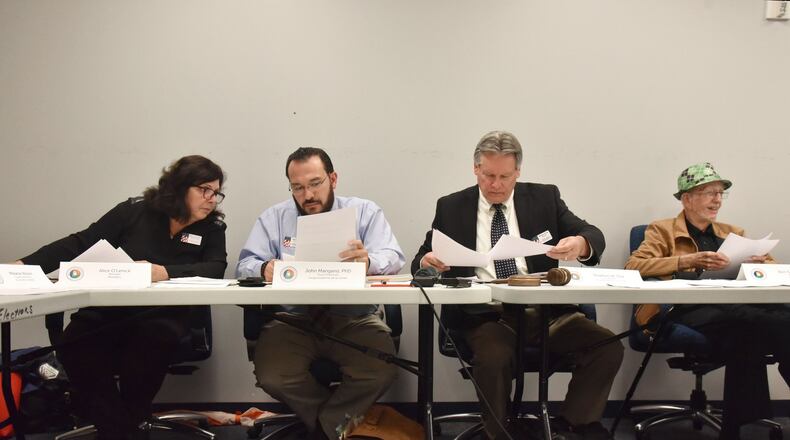Two members of Gwinnett County’s elections board defended themselves Tuesday against charges of racism based on years-old social media posts.
The Gwinnett NAACP made the allegations against Alice O’Lenick and Ben Satterfield, the two Republicans on Gwinnett’s five-member elections board.
The civil rights group is concerned about the three-year-old posts because the board is tasked with finding the next elections supervisor for Georgia's most diverse county.
That search is being scrutinized by voting rights advocates and minority leaders following ciristism of the county’s handling of recent elections.
NAACP President Penny Poole's claims are based largely on a 2016 report from a group called Allied Progress, which detailed a series of Facebook posts and comments on O'Lenick's and Satterfield's accounts. Allied Progress bills itself as a watchdog organization that holds "special interests and their allies" accountable.
The social media activity highlighted includes a post made in the aftermath of the 2015 terrorist attacks in Paris, France, in which Satterfield wrote, "Don't you just love those Peace Loving Muslims, let us open our borders for them!!!"
O’Lenick commented on that post, writing that she agreed with her colleague and that Muslims “who stand silent and do not condemn nor root out the evil are they themselves evil.”
“And yes,” O’Lenick wrote, “I have read their book and in page 2 it says to murder.”
At Tuesday night’s elections board meeting, Poole provided printed screenshots of those posts and another in which O’Lenick wrote that “after emancipation all black Americans were offered free transport, a home, livestock if they wanted to return to Africa … so there was no force to stay.”
The report from Allied Progress mentions several more posts. However, the AJC has not been able to verify them.
“I did not expect [the elections board] to respond” Tuesday night, Poole said, “but I do expect them to remove Ben and Alice. Because they have publicly betrayed the community with their remarks, racism and bias.”
Asked about the report, neither O’Lenick or Satterfield questioned its authenticity. But both defended themselves.
“Ms. Poole considers me a racist, I’m not a racist,” O’Lenick said. “I grew up in an inner city, I have family members who are part African-American. I have family members that are part Hispanic. I have no animus toward any race whatsoever.”
Said Satterfield: “Anybody knows I’m not a racist. By no means.”
Gwinnett County’s election board is a unique body in that most of its members are appointed by the local political parties: Gwinnett Republicans appoint two members, Gwinnett Democrats appoint two more, and those four members then appoint a fifth independent member.
The Gwinnett County Republican Party did not immediately comment Wednesday morning on the O’Lenick and Satterfield issue.
Elections board chairman John Mangano, meanwhile, said he hadn’t reviewed the materials that Poole presented Tuesday night. But Mangano, who is the board’s independent member, added that he had “no proof of [O’Lenick or Satterfield] not being able to serve all the citizens of Gwinnett fairly.”
A changing electorate
Gwinnett County is one of the most diverse counties in the southeastern United States, a majority-minority community with sizable black, Latino and Asian populations.
More than half of its registered voters described themselves as non-white for the first time in the county's history in October 2016. Gwinnett is now federally mandated to provide ballots and other elections materials in Spanish.
Gwinnett's politics have shifted too, with Democratic candidates dominating recent countywide races. The county commission has its first two Democrats in three decades and its delegation to the state legislature is now overwhelmingly blue.
All of those shifts have brought an increased focus on Gwinnett’s elections, which came to a head during a contentious November campaign season.
Gwinnett drew ire — and litigation — from voting rights advocates and Democrats after it was reported that the county had rejected a disproportionate number of absentee ballots, many of them from minority voters.
County officials have repeatedly defended their interpretation of state law and handling of elections, including on Tuesday.
“I think if you were to look at the bigger picture and look outside of Gwinnett, then maybe people would realize, we may not like the law, but they were following the law,” outgoing elections supervisor Lynn Ledford said. “We may not like that state election board rule, but they were adhering to that state election board rule. Just because the other counties weren’t or had a different interpretation doesn’t necessarily make it right or wrong. … We’ve never changed our interpretation of anything that we’ve done.”
Ledford, who has been elections supervisor since 2002, is being promoted to a new division director position that will focus on bigger picture oversight and special projects. The elections board that includes O'Lenick and Satterfield is tasked with finding her replacement.
Under pressure from advocates following a quiet start to the search, the board voted Tuesday to extend the application period by two weeks.
With 42 applications already received, O’Lenick questioned the need to do so.
“It’s really hard when she’s pushing back” on issues, state Rep. Donna McLeod, D-Lawrenceville, said after the meeting. “I don’t know if it’s really being helpful … or if it’s rooted in another position. She’s being ineffective right now because nobody really trusts her on what she’s doing.”
O’Lenick said she is more than capable of serving the entire community.
“I don’t consider anyone’s race or religion or non-religion when making a decision on the elections board,” she said. “I try to do what’s best for the electorate of the county.”
About the Author
The Latest
Featured




